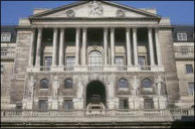



UK Solutions - Other issues
Religion
The monarch is head of state of the United Kingdom and a number of other countries and dependencies, and also the head of the Church of England. The Church of England is part of the British government. This carries with it an implication that the Church of England is the preferred religion for citizens of the UK and that official functions that have a spiritual element, such as mourning the death of a popular figure, should feature an element of Church of England Christian worship. This potentially disadvantages those of other religions or of no religion. Prince Charles recognised this as a problem when he stated that when he becomes King, he would like the title “Defender of the Faith” changed to ”Defender of Faiths”, to indicate his support for self determination. The only way to ensure that all citizens of the new Britain are free, now and in the future, to practice a religion of their own choosing, or no religion at all, is to disestablish the Church. The state should repeal any laws and cease any practices which seek to interfere with the citizen’s right of self determination in matters of religion.
Currency
The Bank of England’s name appears on all sterling bank notes, confirming that England holds the United Kingdom’s purse strings. Therefore the Bank of England must have a change of name; say “British Reserve Bank” or “Bank of Britain”. (Perhaps not the latter. Visions of Rowan Atkinson calling it “BoB” in his own inimitable fashion, spring to mind.) This would obviate the need for member nations to print their own bank notes in order to establish their identity as being “not English”. Just as the Euro has variant national designs, the pound too could have an element that identifies member nations, if that is what they desire. There should also be a board member for each of the four member nations, specifically to represent the views of those nations on monetary matters.Other considerations
Anyone born in the County of Rutland should have the right to claim British nationality and/or nationality of any one of the member nations of Britain, should it ever be necessary or desirable for them to do so (such as representation in sport or simply family affiliation preference).PS
A wild, exciting, random thought – a new Britain of equal partners might persuade Ireland to join as they would retain their existing identity and government in Dublin and would only hand authority to Britain on matters that they are happy to share with the other members. This could pave the way for the north and south of that island to reunite into a single Irish nation and, hopefully end the conflict there for good!.




© Walter Jardine 2016


UK/EU





Religion
The monarch is head of state of the United Kingdom and a number of other countries and dependencies, and also the head of the Church of England. The Church of England is part of the British government. This carries with it an implication that the Church of England is the preferred religion for citizens of the UK and that official functions that have a spiritual element, such as mourning the death of a popular figure, should feature an element of Church of England Christian worship. This potentially disadvantages those of other religions or of no religion. Prince Charles recognised this as a problem when he stated that when he becomes King, he would like the title “Defender of the Faith” changed to ”Defender of Faiths”, to indicate his support for self determination. The only way to ensure that all citizens of the new Britain are free, now and in the future, to practice a religion of their own choosing, or no religion at all, is to disestablish the Church. The state should repeal any laws and cease any practices which seek to interfere with the citizen’s right of self determination in matters of religion.
Currency
The Bank of England’s name appears on all sterling bank notes, confirming that England holds the United Kingdom’s purse strings. Therefore the Bank of England must have a change of name; say “British Reserve Bank” or “Bank of Britain”. (Perhaps not the latter. Visions of Rowan Atkinson calling it “BoB” in his own inimitable fashion, spring to mind.) This would obviate the need for member nations to print their own bank notes in order to establish their identity as being “not English”. Just as the Euro has variant national designs, the pound too could have an element that identifies member nations, if that is what they desire. There should also be a board member for each of the four member nations, specifically to represent the views of those nations on monetary matters.Other considerations
Anyone born in the County of Rutland should have the right to claim British nationality and/or nationality of any one of the member nations of Britain, should it ever be necessary or desirable for them to do so (such as representation in sport or simply family affiliation preference).PS
A wild, exciting, random thought – a new Britain of equal partners might persuade Ireland to join as they would retain their existing identity and government in Dublin and would only hand authority to Britain on matters that they are happy to share with the other members. This could pave the way for the north and south of that island to reunite into a single Irish nation and, hopefully end the conflict there for good!.




Other UK Issues




















